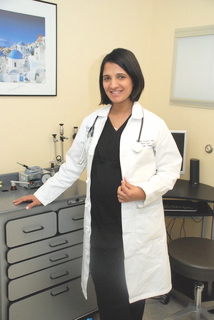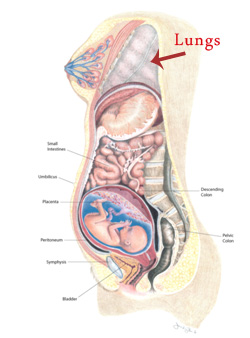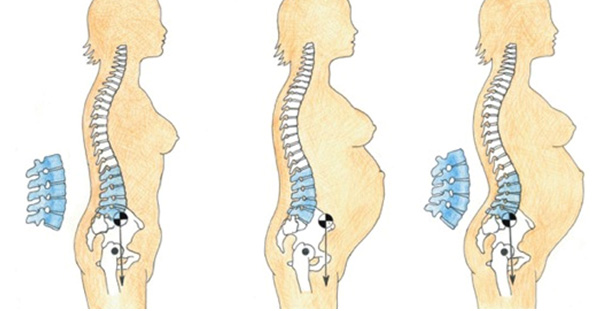- Question: How do the ingredients in e-cigarettes and vaporizers affect respiratory health? - August 16, 2019
- Bad Technique and Vocal Injury - January 9, 2019
- Is Edible Marijuana Dangerous for the Voice? Myths Dispelled - December 18, 2018
- Surprise! You have a hemorrhage - January 31, 2018
- Graves’ Disease: Treatment Overview - September 25, 2017
- Adele and the Stigma of Vocal Injury - July 11, 2017
- Vocal Curbside Consult: How does the thyroid affect the voice? - May 16, 2017
- Vocal Curbside Consult: How do hormones affect the voice? - May 3, 2017
- Vocal Curbside Consult: How do emotion and stress affect the voice? - April 17, 2017
- Vocal Curbside Consult: Vocal Recovery After Illness - April 7, 2017
 As a laryngologist who has treated many pregnant women, I understand that pregnancy is a hugely life-changing event. I also understand that many professional voice users choose to get pregnant. But I honestly don’t think I truly got it until I got it myself… pregnant, that is.
As a laryngologist who has treated many pregnant women, I understand that pregnancy is a hugely life-changing event. I also understand that many professional voice users choose to get pregnant. But I honestly don’t think I truly got it until I got it myself… pregnant, that is.
During pregnancy, the profound rise in estrogen and progesterone changes almost every aspect of a woman’s body.
Changes that affect voice include:
- Swelling (edema) of the vocal folds
- Altered or shifted range
- Increased fragility of vocal fold blood vessels
- Increased propensity for acid reflux (LPR)
- Decreased lung capacity
- Decreased nasal/sinus resonance (difficulty placing sound “in the mask”)
- Altered posture
Swelling/edema of vocal folds and Altered or shifted range
Just as you swell almost everywhere else, your vocal folds swell too. This causes an increased mass (or heaviness) of your vocal folds, which can alter your total singing range. Specifically, you may lose top notes but gain notes at the bottom. The most important thing is that you not strain to reach those top notes if you’ve lost them because the increasingly fragile blood vessels are more likely to rupture and the swollen vocal folds are more likely to tear.
Increased fragility of vocal fold blood vessels
Again, like the blood vessel dilation that occurs everywhere else (causing vaginal swelling, hemorrhoids, varicose veins), the blood vessels in your vocal folds dilate. This makes them more prone to rupture so take it easy and don’t use these nine months to try to expand your range.
 Increased propensity for LPR
Increased propensity for LPR
This is very familiar for anyone who has ever been pregnant. Hormones cause relaxation of the sphincter that keeps food in your stomach (and normally prevents it from coming up into your larynx). Also, your stomach capacity is less; when it gets full (which happens quicker than normal), you’re more likely to regurgitate acid. Heartburn, throat clearing, postnasal drip, and altered voice are all symptoms.
Decreased lung capacity
It is obviously harder to get a full breath in when the baby is pushing your diaphragm (and every other organ) up. You may notice decreased endurance, vocal fatigue, and inability to sustain notes as long as you used to.
Decreased nasal/sinus resonance
Of course, your nose is no exception to the “everything swells” rule and rhinitis of pregnancy results in decreased ability to breathe through your nose. This also means sound can’t resonate through the nose and into the sinuses, which may result in less lustre in the voice.
Altered posture

Again, anyone pregnant knows about the shifts that occur in your back, pelvis, and chest. This alters your entire support mechanism, enough that some women can’t sing in their last trimester. The most important thing is to not push it. You risk getting into bad support habits that become very difficult to correct post-partum.
All these changes mean that it will likely be more difficult for you to sing, although some women report it’s actually easier for them to sing. The most important thing to realize is that this is not the time to push your voice to new limits. Accept these limitations, understand that your voice and your body have changed, and sing as feels easy. This is the safest way to get through your pregnancy with your singing voice unaffected. Most of the voice changes related to pregnancy will resolve after delivery and/or breastfeeding.
Signs that you need an in-office evaluation by a laryngologist include:
- A sudden change in voice while singing or speaking, or after coughing or sneezing
- Pain with singing/speaking
- Significant loss of vocal range (i.e., more than five notes)
To learn more about Dr. Reena Gupta voice problems, visit: http://www.voicedoctorla.com/
Contact a Physician at Osborne Head & Neck Institute
If you would like to speak with one of our physicians regarding this issue or another ear, nose, throat problem; or have other questions or concerns, please complete the contact form below or call us at 310-657-0123.



